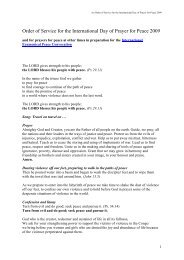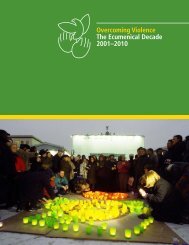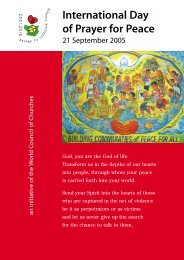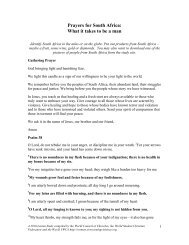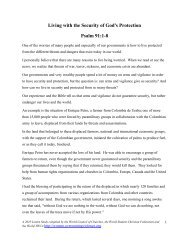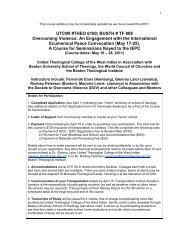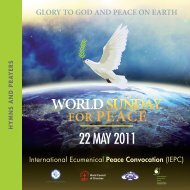Alternative Globalization Addressing Peoples and Earth
Alternative Globalization Addressing Peoples and Earth
Alternative Globalization Addressing Peoples and Earth
Create successful ePaper yourself
Turn your PDF publications into a flip-book with our unique Google optimized e-Paper software.
1. PART 1. THE AGAPE CHALLENGE<br />
1<br />
God loves righteousness <strong>and</strong> justice; the earth is full of<br />
the steadfast love of the Lord.<br />
1.1 The AGAPE process<br />
(Ps. 33:5)<br />
The AGAPE challenge is a response to the question raised at the World<br />
Council of Churches (WCC) assembly in Harare, Zimbabwe, in 1998: “How<br />
do we live our faith in the context of globalization?” 1 Churches <strong>and</strong> the<br />
wider ecumenical family, which includes world communions, regional<br />
ecumenical organizations <strong>and</strong> specialized ministries, have wrestled with<br />
this question over the past seven years or so.<br />
In a series of consultations <strong>and</strong> studies on economic globalization 2 , they<br />
were guided by the section on globalization in the Report of the Harare<br />
assembly that recognized the pastoral, ethical, theological <strong>and</strong> spiritual<br />
challenges that globalization poses to the churches <strong>and</strong> the ecumenical<br />
movement. “The logic of globalization needs to be challenged by an<br />
1<br />
From the very beginning of this process, the WCC has made a clear distinction between<br />
globalization as a multi-faceted historic process <strong>and</strong> the present form of a pernicious<br />
economic <strong>and</strong> political project of global capitalism. This form of globalization is based on<br />
an ideology that those groups <strong>and</strong> movements involved in the World Social Forum have<br />
described as “neoliberalism” (cf. part 3.2 of this document). This distinction between<br />
these two underst<strong>and</strong>ings of globalization was introduced by the Copenhagen Seminars<br />
for Social Progress, cf. Jacques Baudot (ed.), Building a World Community. <strong>Globalization</strong><br />
<strong>and</strong> the Common Good, Royal Danish Ministry of Foreign Affairs: Copenhagen 2000, p.<br />
44f.<br />
2<br />
From the process from Harare to the present Assembly, see Appendix.




